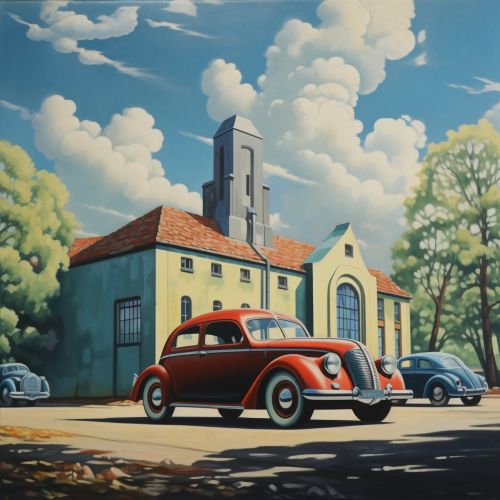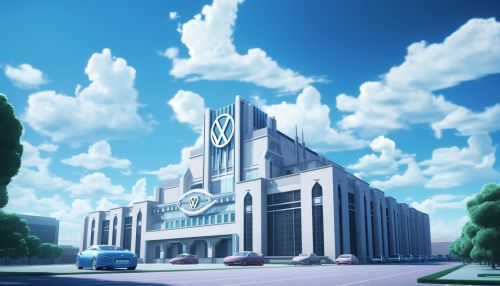Volkswagen
History
Volkswagen, literally translating to "People's Car," is a German automaker founded on 28 May 1937 by the German Labour Front under Adolf Hitler and headquartered in Wolfsburg, Germany. The company was originally operated by the German Labour Front, a Nazi organization. The idea behind the company was to create a car that was affordable and practical for all Germans, a concept that was heavily promoted by Adolf Hitler. This concept resulted in the creation of the Beetle, one of the best-selling cars of all time.


The company's operations were significantly affected by World War II, with the factory being repurposed to produce military vehicles. Post-war, the company was restructured and managed by the British Army, under Major Ivan Hirst. The company's production resumed, focusing on the production of the Beetle, which was seen as a symbol of Germany's recovery.
In the 1950s, Volkswagen expanded its range with the introduction of the Type 2, also known as the Transporter, which gained popularity as a camper van. The company continued to grow and innovate, introducing the Golf in 1974, which has since become its best-selling model and is often credited with saving the company from financial ruin.
Products and Services
Volkswagen offers a wide range of vehicles, from compact cars and sedans to SUVs and luxury vehicles. The company's product line includes the Golf, Beetle, Jetta, Passat, Arteon, Tiguan, and Atlas, among others. Volkswagen also offers electric vehicles, such as the ID.4, as part of its commitment to sustainable mobility.
In addition to vehicles, Volkswagen provides a range of services, including financing, leasing, and insurance, through Volkswagen Financial Services. The company also offers after-sales services, including maintenance and repair, parts replacement, and roadside assistance.
Manufacturing and Operations
Volkswagen operates approximately 120 production plants in 20 European countries and a further 11 countries in the Americas, Asia, and Africa. The company's largest plant is located in its headquarters in Wolfsburg, Germany, which is one of the largest and most advanced car factories in the world.
Volkswagen's manufacturing process is characterized by high levels of automation and efficiency, with a strong focus on quality control. The company is known for its use of advanced manufacturing technologies, such as robotics and digital manufacturing systems.
Corporate Structure and Governance
Volkswagen AG is the parent company of the Volkswagen Group, which includes several well-known car brands, including Audi, SEAT, Škoda, Bentley, Bugatti, Lamborghini, Porsche, Ducati, Volkswagen Commercial Vehicles, Scania, and MAN. The company is governed by a Board of Management and a Supervisory Board, in accordance with German corporate law.
The company's shares are listed on the Frankfurt Stock Exchange and are included in the DAX index, which consists of the 30 major German companies trading on the Frankfurt Stock Exchange.
Environmental Impact and Sustainability
Volkswagen has faced criticism for its environmental impact, particularly in relation to the emissions scandal in 2015, where the company admitted to installing software in its diesel cars to cheat emissions tests.
In response to this, and as part of its broader sustainability strategy, Volkswagen has committed to becoming carbon neutral by 2050. The company is investing heavily in electric vehicles and aims to stop selling combustion-engine vehicles in Europe by 2035.
